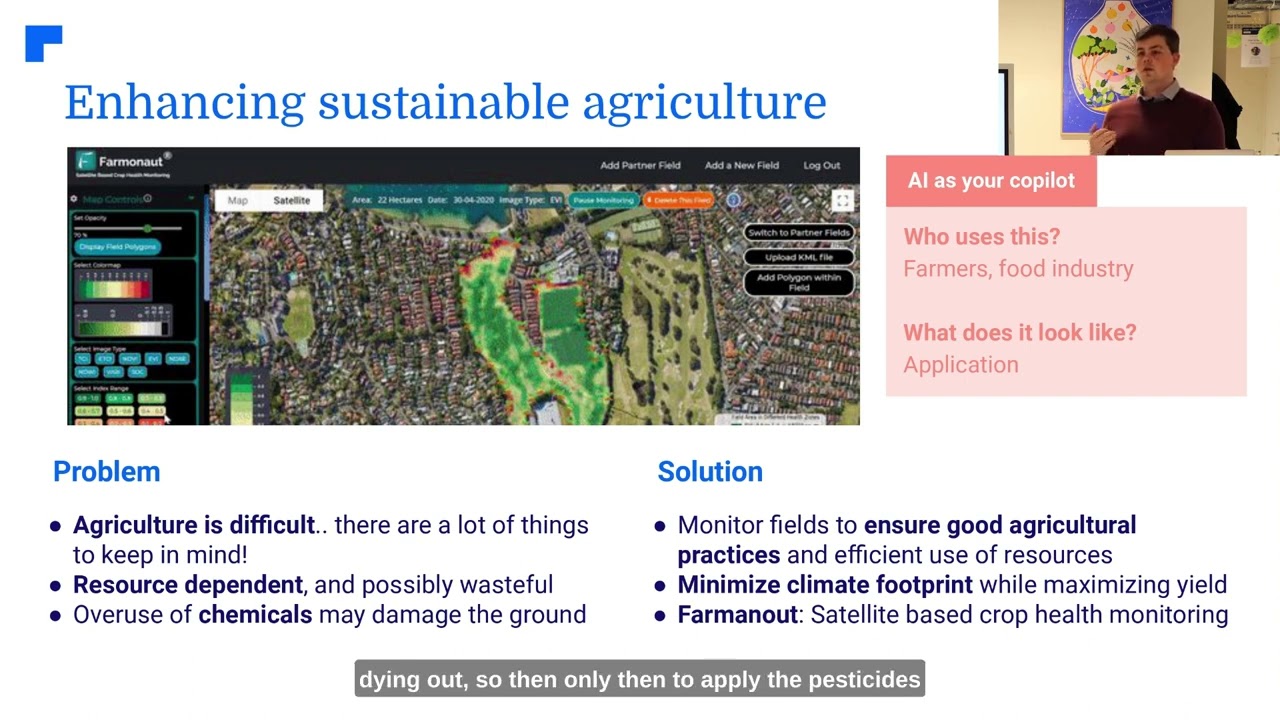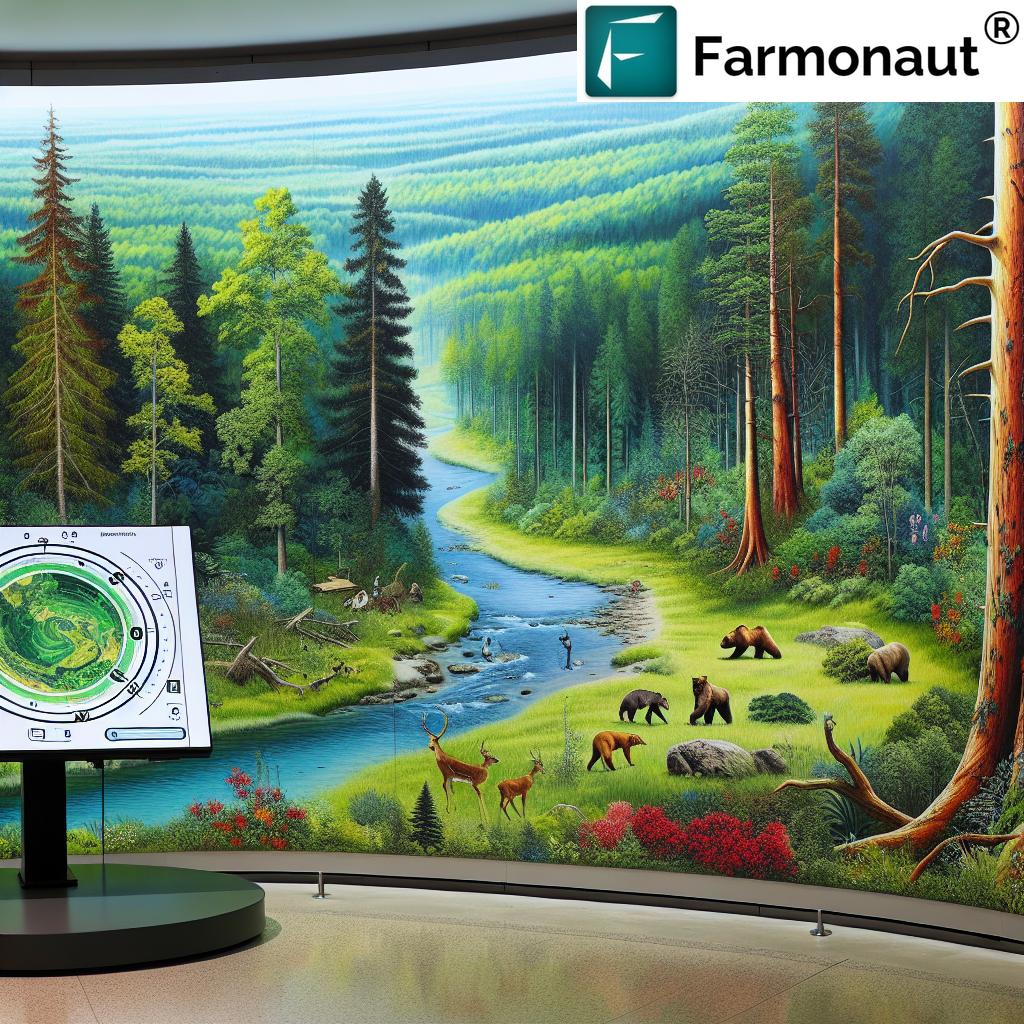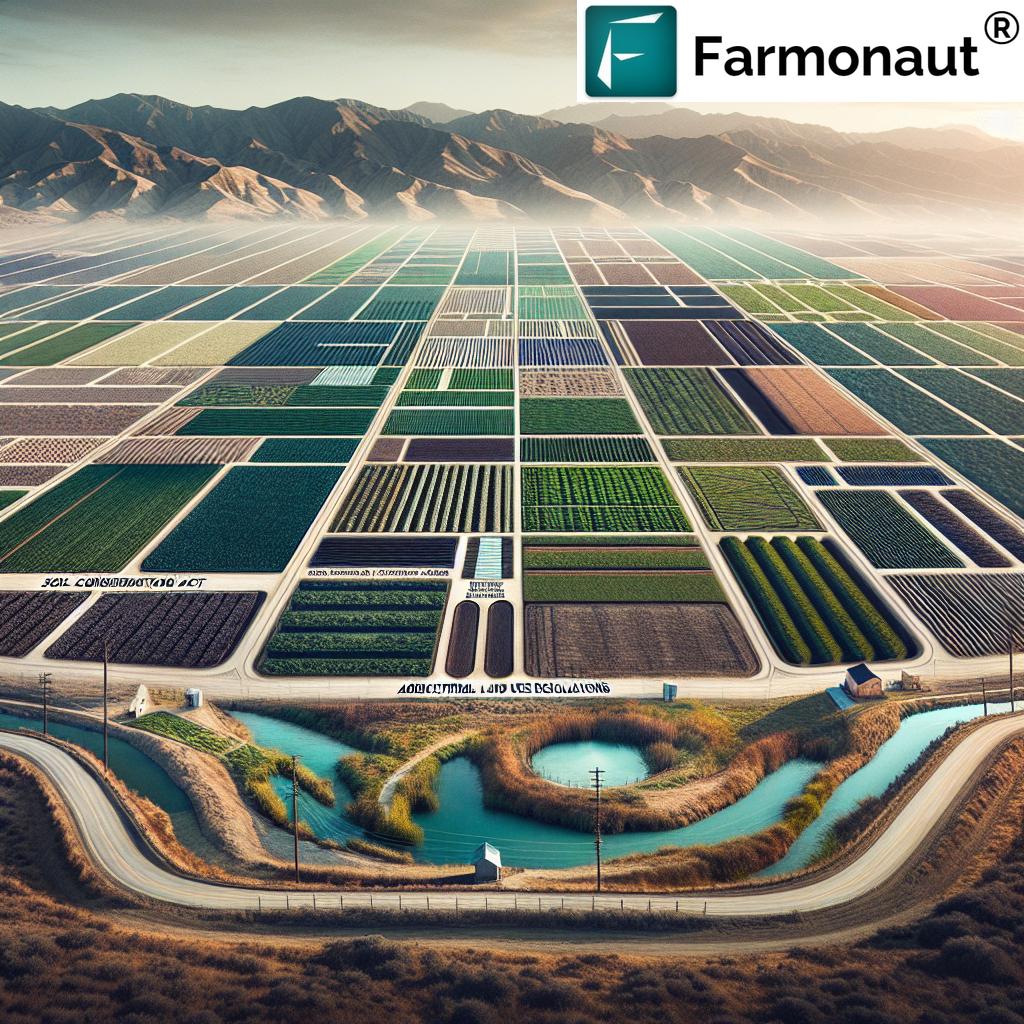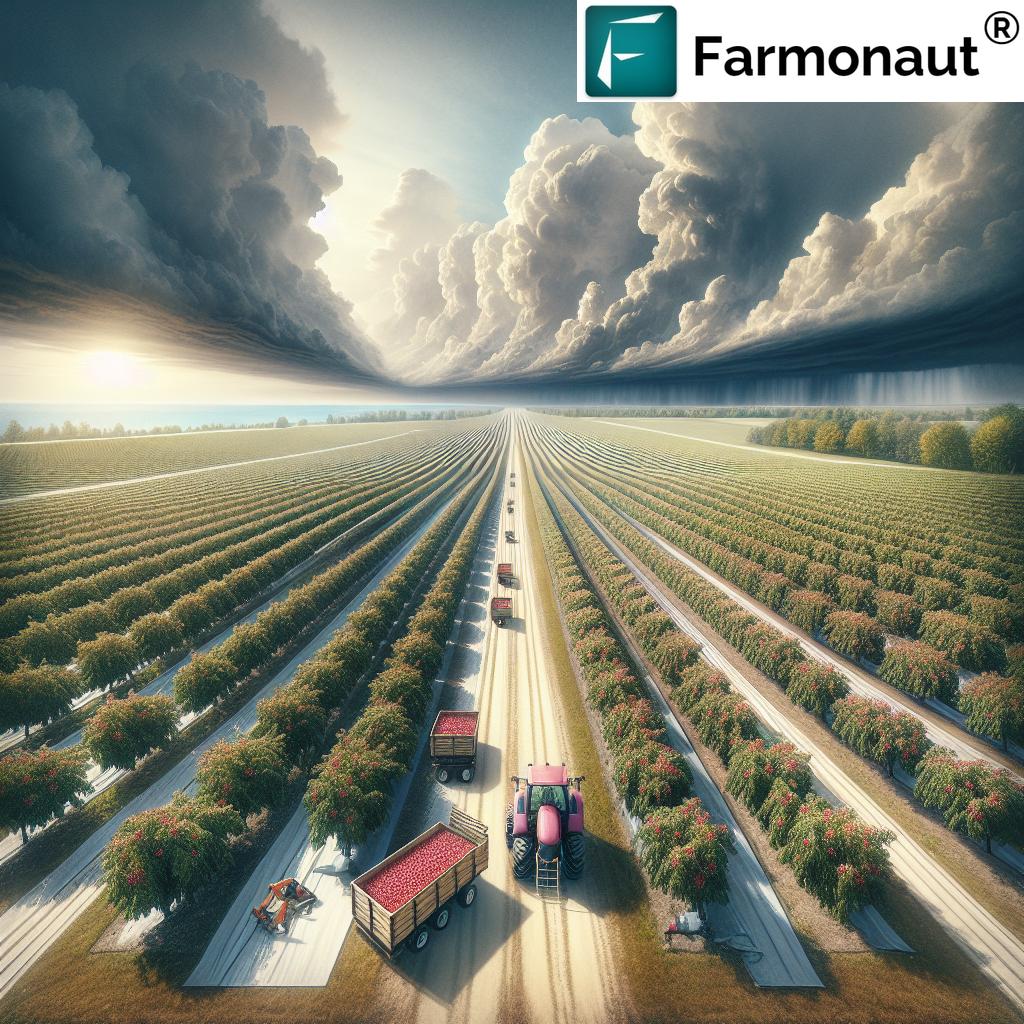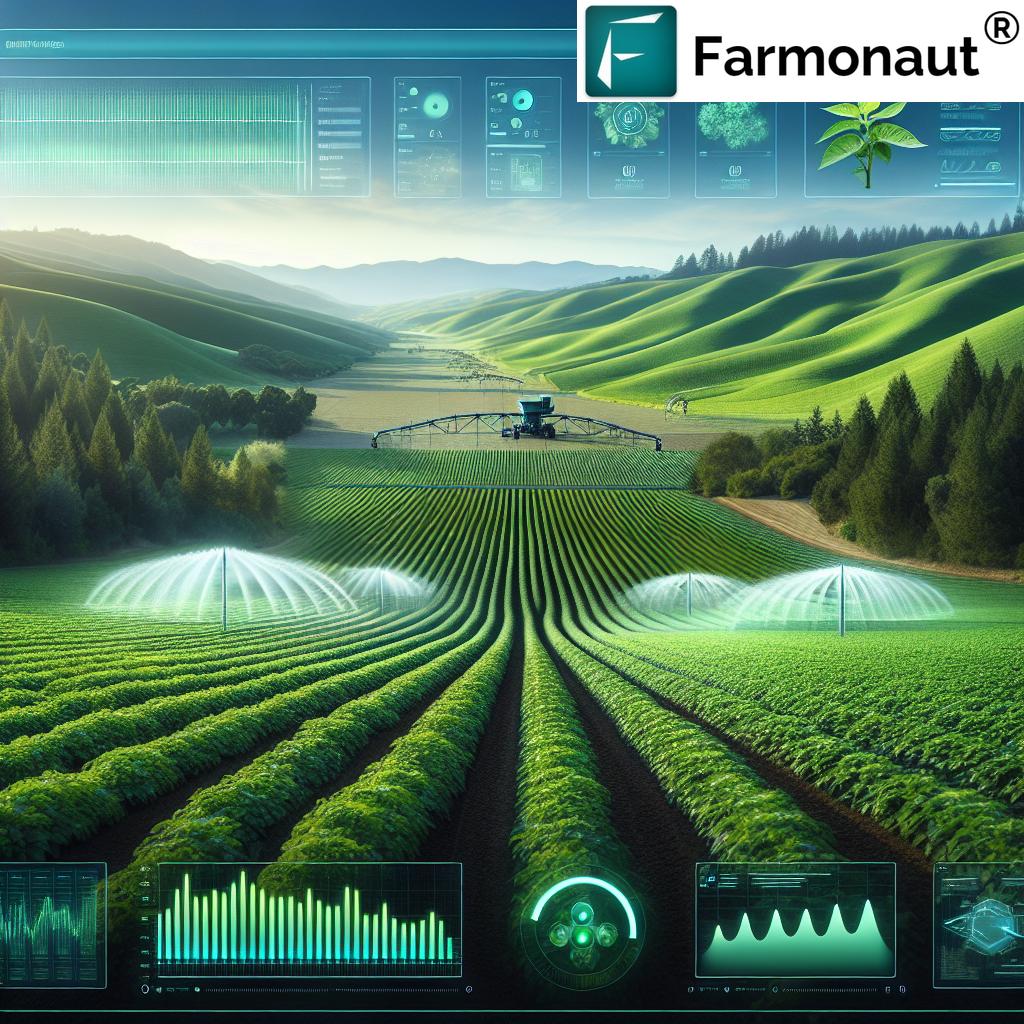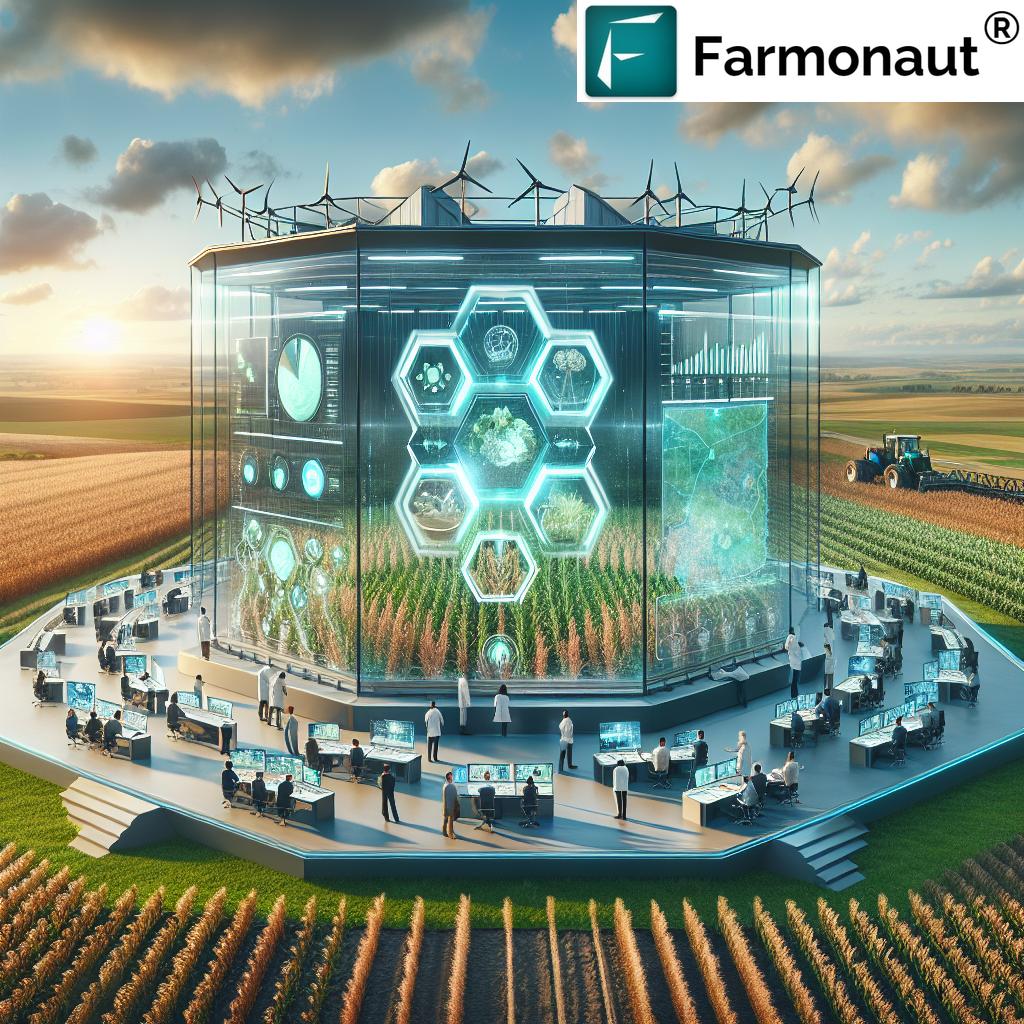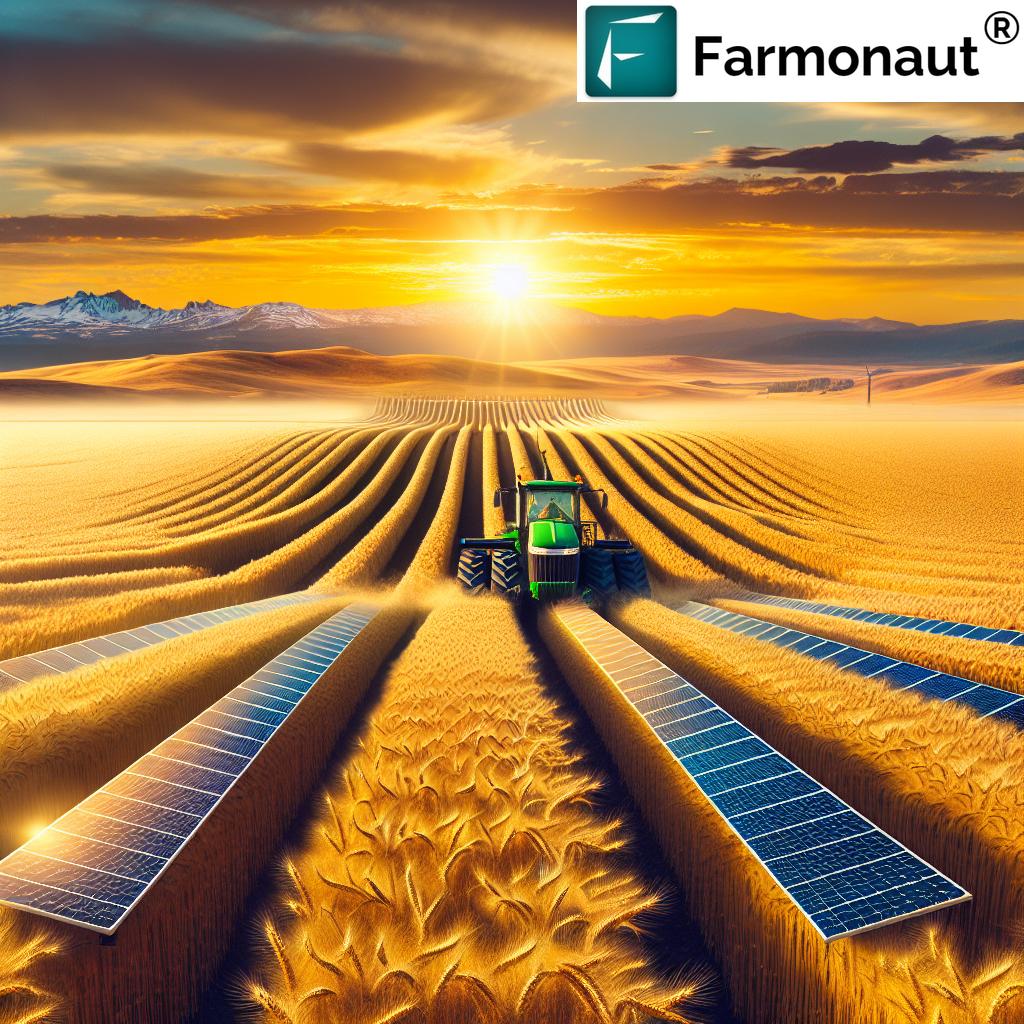Revolutionizing Agriculture: How AI and Soil Sensors Are Transforming Farming in West Lafayette, Indiana
“AI-powered soil sensors can provide hundreds of data points per acre for real-time crop monitoring.”
In the heart of America’s heartland, a quiet revolution is taking place. West Lafayette, Indiana, home to Purdue University, is at the forefront of a technological transformation that promises to reshape the future of farming. As we delve into the world of agricultural artificial intelligence (AI) and advanced soil sensors, we’re witnessing the dawn of a new era in crop management and sustainable farming practices.
At Farmonaut, we’re excited to be part of this agricultural revolution, offering cutting-edge satellite-based farm management solutions that complement the groundbreaking work being done in West Lafayette. Our mission aligns perfectly with the innovations emerging from this agricultural hub: making precision agriculture accessible and affordable for farmers worldwide.
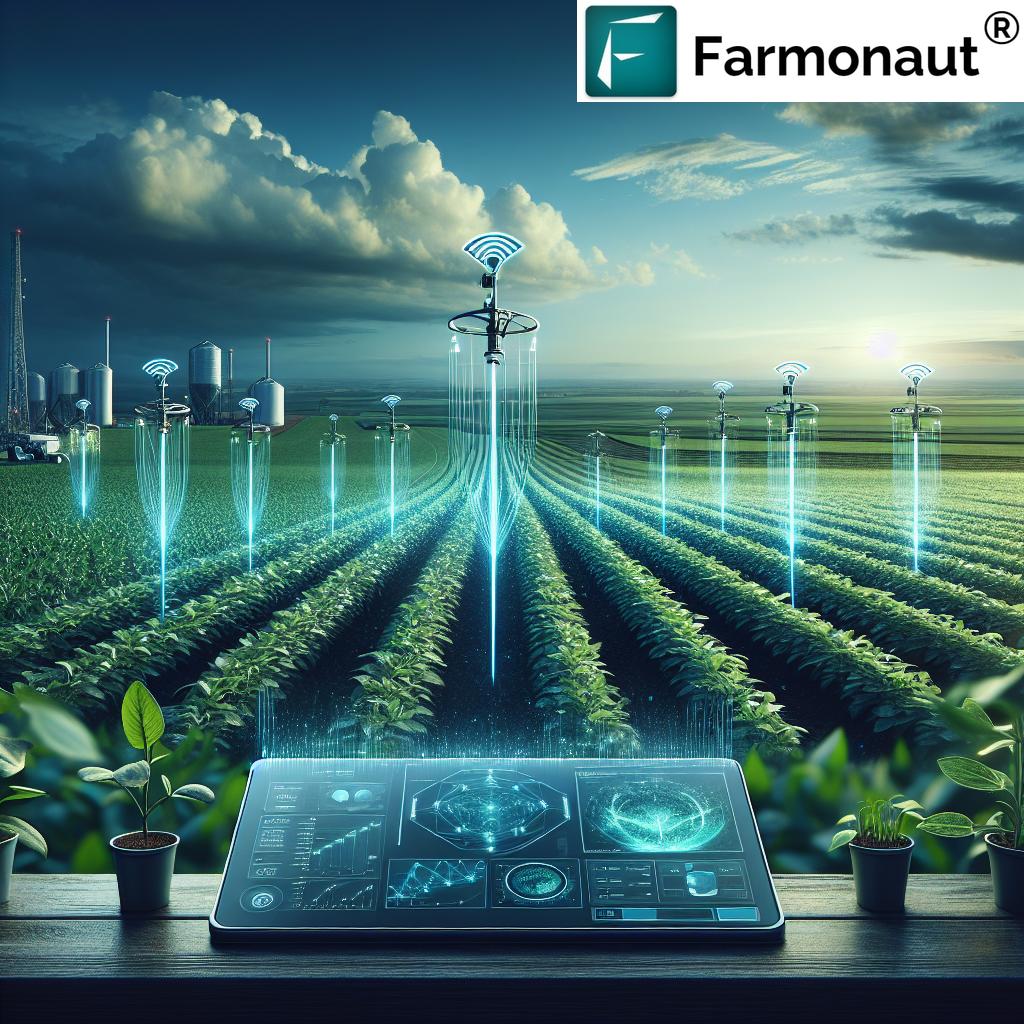
The AI Revolution in Agriculture
Artificial intelligence in agriculture is not just a buzzword; it’s a game-changer that’s revolutionizing crop farming decisions. In West Lafayette, researchers at Purdue University are at the cutting edge of this transformation, developing smart farming solutions that promise to overhaul traditional agricultural practices.
David Love, the Nick Trbovich professor of electrical and computer engineering at Purdue, paints a vivid picture of the future: “Right now, a soil moisture sensor, you’d have about 1 of those per 100 acres. In the future, you might have hundreds, or even more, per acre.” This dramatic increase in data points will provide farmers with unprecedented insights into their fields, enabling them to make more informed decisions about crop management.
The Power of Data-Driven Farming
The core of this agricultural revolution lies in the power of data. AI learns by analyzing vast amounts of information, and the more data it has access to, the more accurate and useful its insights become. This is where advanced soil sensors come into play, gathering crucial information about soil moisture, nutrient levels, and other vital parameters.
Dennis Buckmaster, professor of agriculture at Purdue University, emphasizes the transformative potential of this data-rich environment: “There’s so much data that sometimes we’re just buried in it, and we don’t have time to analyze it. That’s where we can leverage artificial intelligence.”
At Farmonaut, we understand the power of data in revolutionizing agriculture. Our satellite-based crop health monitoring system provides farmers with real-time insights into vegetation health (NDVI), soil moisture levels, and other critical metrics. This data-driven approach aligns perfectly with the AI-powered future being developed in West Lafayette.
Precision Agriculture Technology: The Future of Farming
The integration of AI and soil sensors is ushering in a new era of precision agriculture technology. This approach allows farmers to apply the right amount of inputs (water, fertilizers, pesticides) at the right time and in the right place, maximizing efficiency and minimizing waste.
In West Lafayette, researchers are developing weatherproof field computers that can process and display the data gathered by these advanced sensors in real-time. This immediate access to information allows farmers to monitor their crops continuously and respond quickly to any issues that arise.
Smart Farming Solutions: A New Paradigm
Smart farming solutions are transforming how farmers manage their fields. These AI-powered systems can alert farmers to nutrient deficiencies, pests, or diseases, enabling timely interventions. As Buckmaster explains, “When there is a nutrient deficiency, a pest, or a disease that’s when I have to take action and if AI can alert me to the right field at the right time that’s when you get the payback.”
This payback comes in the form of significantly more efficient farms. Buckmaster envisions a future with “Fewer amounts of fertilizer. Fewer passes with the spray machine. Higher quality grain. More grain. Less water.” These improvements not only boost productivity but also contribute to more sustainable farming practices.
At Farmonaut, we’re proud to contribute to this new paradigm of smart farming. Our Jeevn AI Advisory System delivers real-time insights, weather forecasts, and expert crop management strategies to farmers, aligning perfectly with the vision of AI-powered agriculture being developed in West Lafayette.
Crop Monitoring with AI: A New Level of Precision
The future of farming is all about precision, and AI-powered crop monitoring is leading the charge. In West Lafayette, researchers are developing systems that can provide hundreds of data points per acre, offering an unprecedented level of detail about crop health and field conditions.
This level of precision allows for micro-management of fields, with farmers able to address issues on a plant-by-plant basis if necessary. It’s a far cry from the broad-brush approach of traditional farming methods, where entire fields might be treated uniformly regardless of variations in soil conditions or crop health.
“Smart farming solutions aim to reduce fertilizer, pesticide, and water use while increasing grain quality and yield by 2030.”
The Environmental Impact of AI in Agriculture
One of the most exciting aspects of this agricultural revolution is its potential environmental impact. By enabling more precise application of fertilizers and pesticides, AI-powered farming could significantly reduce the amount of chemicals introduced into the environment.
This aligns perfectly with the growing global focus on sustainable farming practices. At Farmonaut, we’re committed to this vision of sustainability. Our carbon footprinting feature helps agribusinesses monitor and reduce their environmental impact, providing real-time data on emissions and enabling steps towards more sustainable operations.
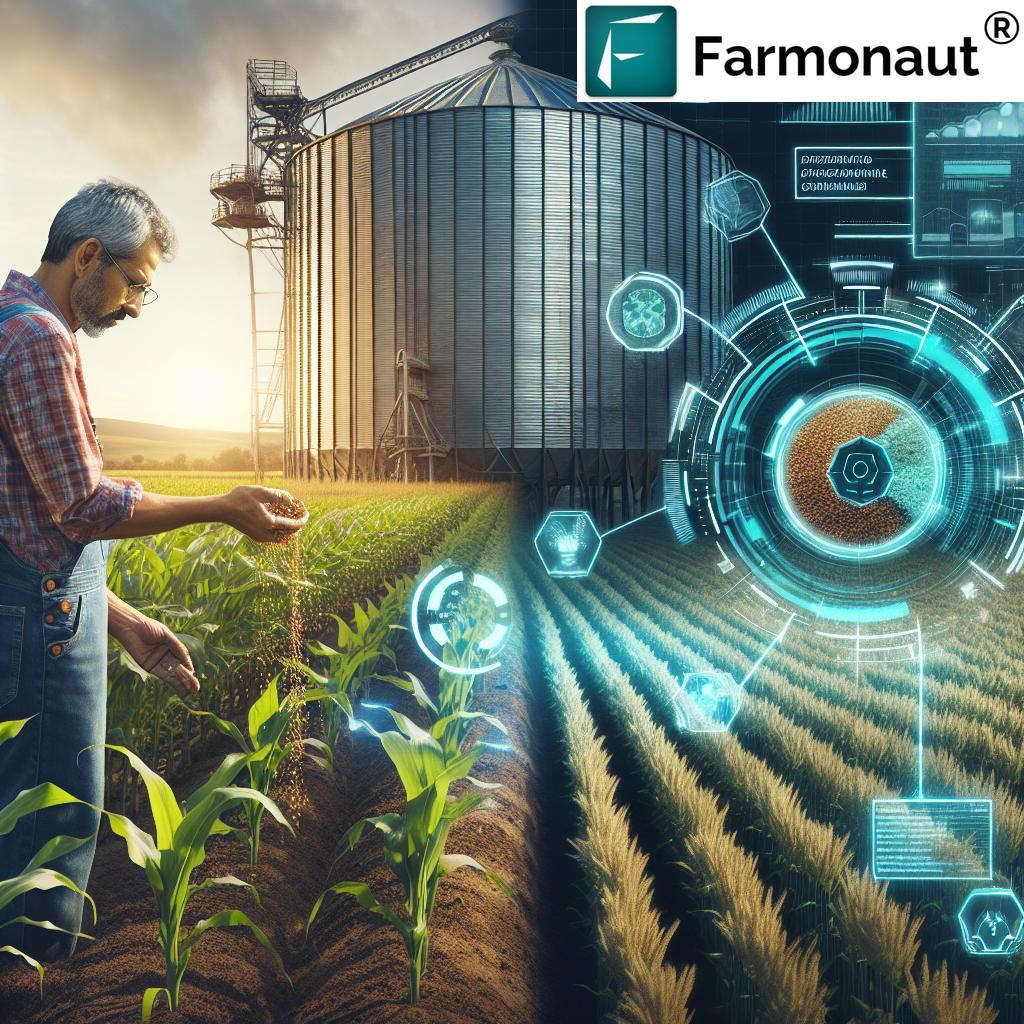
Data-Driven Farming Decisions: The Power of AI
The true power of AI in agriculture lies in its ability to process vast amounts of data and provide actionable insights. In West Lafayette, researchers are feeding AI models with extensive data to teach them to recognize when something is wrong with a specific crop or field.
This capability transforms the decision-making process for farmers. Instead of relying solely on experience and intuition, farmers can now base their decisions on real-time, data-driven insights. This doesn’t replace the farmer’s expertise but rather enhances it, providing an additional layer of information to inform crucial farming decisions.
Overcoming Adoption Challenges
Despite the clear benefits, some farmers might be hesitant to adopt this new technology. Change can be daunting, especially in an industry as traditional as agriculture. However, as Buckmaster notes, “Any time you could improve a decision, or make your decision a little easier with better confidence then I think they’re going to find it useful.”
At Farmonaut, we understand these challenges and strive to make our technology as user-friendly and accessible as possible. Our platform is designed to be intuitive and easy to use, even for those who might not be tech-savvy. We believe that by demonstrating the clear benefits of AI-powered farming, we can help overcome these adoption challenges and bring the benefits of precision agriculture to farmers worldwide.
The Future of Farming: AI and Beyond
As we look to the future, it’s clear that AI and advanced soil sensors will play an increasingly important role in agriculture. David Love predicts that by “2030, 2030s, where you start seeing these sensors take off.” This timeline aligns with global efforts to increase food production sustainably to meet the needs of a growing world population.
The future of farming promises to be more efficient, more sustainable, and more data-driven than ever before. From AI-powered decision-making to precision application of inputs, the agricultural landscape is set for a dramatic transformation.
Farmonaut’s Role in the Agricultural Revolution
At Farmonaut, we’re excited to be part of this agricultural revolution. Our satellite-based farm management solutions, AI-powered advisory systems, and blockchain-based traceability tools are all designed to complement and enhance the kind of innovations being developed in places like West Lafayette.
We believe that by making precision agriculture accessible and affordable, we can help farmers around the world benefit from these technological advancements. Whether it’s a small family farm or a large agribusiness, our goal is to provide the tools and insights needed to farm more efficiently and sustainably.
Comparing Traditional and AI-Powered Farming Practices
To truly understand the impact of AI and soil sensors on agriculture, it’s helpful to compare traditional farming methods with these new, AI-powered approaches. The following table provides a clear comparison across key agricultural aspects:
| Agricultural Aspect | Traditional Farming | AI-Powered Farming |
|---|---|---|
| Soil Monitoring | Periodic manual testing, limited data points | Continuous monitoring with hundreds of data points per acre |
| Fertilizer Application | Uniform application across fields | Precision application based on real-time soil data (Up to 30% reduction) |
| Pest Detection | Visual inspection, often reactive | Early detection through AI analysis of sensor and image data |
| Water Management | Scheduled irrigation, often inefficient | Precision irrigation based on real-time soil moisture data (Up to 20% water savings) |
| Crop Yield Prediction | Based on historical data and farmer’s experience | AI-powered predictions using multiple data sources (10-20% increase in accuracy) |
This comparison clearly illustrates the transformative potential of AI and soil sensors in agriculture. The shift from uniform, schedule-based approaches to precision, data-driven methods promises significant improvements in efficiency, sustainability, and productivity.
The Role of Farmonaut in Precision Agriculture
As we’ve explored the exciting developments in AI and soil sensor technology in West Lafayette, it’s worth noting how Farmonaut’s solutions complement and enhance these advancements. Our platform offers a range of tools that align perfectly with the vision of precision agriculture being developed at Purdue University and beyond.
- Satellite-Based Crop Health Monitoring: Our use of multispectral satellite images provides farmers with insights into vegetation health (NDVI) and soil moisture levels, complementing the data gathered by ground-based sensors.
- Jeevn AI Advisory System: This AI-driven tool delivers personalized farm advice, weather forecasts, and crop management strategies, aligning with the AI-powered decision support systems being developed in West Lafayette.
- Blockchain-Based Traceability: Our blockchain solutions ensure transparency and security in agricultural supply chains, adding another layer of technology-driven improvement to the farming ecosystem.
- Fleet and Resource Management: These tools help agribusinesses optimize their operations, aligning with the goal of increased efficiency in farming practices.
By offering these advanced solutions through accessible platforms – including web, Android, and iOS apps – we’re helping to democratize access to precision agriculture technology.
The Path Forward: Embracing AI in Agriculture
As we look to the future of farming in West Lafayette and beyond, it’s clear that AI and advanced soil sensors will play a crucial role. The potential benefits – from increased efficiency and productivity to improved sustainability – are too significant to ignore.
However, realizing this potential will require collaboration between researchers, technology providers, and farmers. It will also require a willingness to embrace new technologies and ways of working. At Farmonaut, we’re committed to supporting this transition, providing user-friendly tools and clear demonstrations of the benefits of AI-powered farming.
As we move towards 2030 and beyond, we envision a future where every farmer, regardless of the size of their operation, has access to the benefits of AI and precision agriculture technology. It’s a future where farming is more efficient, more sustainable, and more data-driven than ever before.
Conclusion: A New Era in Agriculture
The developments in West Lafayette, Indiana, represent the dawn of a new era in agriculture. By harnessing the power of AI and advanced soil sensors, we’re opening up new possibilities for efficient, sustainable, and productive farming.
At Farmonaut, we’re proud to be part of this agricultural revolution. Our satellite-based solutions and AI-powered tools complement and enhance the groundbreaking work being done at institutions like Purdue University. Together, we’re working towards a future where precision agriculture is not just a possibility, but a reality for farmers around the world.
As we continue to develop and refine these technologies, we’re excited about the potential to transform agriculture, boost food production, and contribute to a more sustainable future. The revolution in farming is here, and it’s powered by AI, advanced sensors, and innovative solutions like those offered by Farmonaut.
Frequently Asked Questions
- What is AI in agriculture?
AI in agriculture refers to the use of artificial intelligence technologies to improve farming practices. This includes using machine learning algorithms to analyze data from soil sensors, satellite imagery, and other sources to provide insights and recommendations to farmers. - How do soil sensors work in smart farming?
Soil sensors are devices placed in the ground that measure various parameters such as moisture levels, temperature, and nutrient content. These sensors send data to a central system where it can be analyzed to provide real-time information about soil conditions. - What are the benefits of precision agriculture?
Precision agriculture allows for more efficient use of resources, potentially reducing the use of water, fertilizers, and pesticides while improving crop yields. It also enables farmers to make more informed decisions based on real-time data about their fields. - How does Farmonaut contribute to precision agriculture?
Farmonaut provides satellite-based farm management solutions that offer real-time crop health monitoring, AI-based advisory systems, and resource management tools. These solutions help farmers make data-driven decisions to optimize their farming practices. - When will AI-powered farming become widely adopted?
According to researchers at Purdue University, we can expect to see widespread adoption of AI and advanced sensors in farming by the 2030s. However, the transition is already underway, with many farmers already adopting some form of precision agriculture technology.
Earn With Farmonaut
Earn 20% recurring commission with Farmonaut’s affiliate program by sharing your promo code and helping farmers save 10%. Onboard 10 Elite farmers monthly to earn a minimum of $148,000 annually—start now and grow your income!
For more information about our affiliate program, visit https://farmonaut.com/affiliate-program.
Farmonaut Subscriptions
For more information about our API, visit https://sat.farmonaut.com/api or check out our API Developer Docs.





